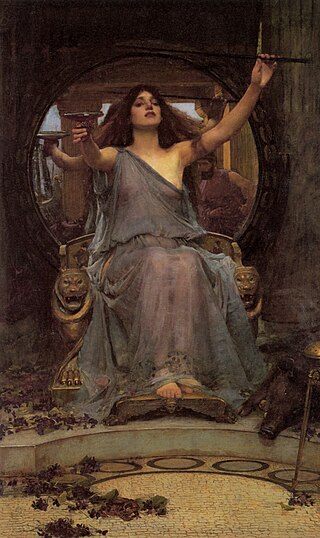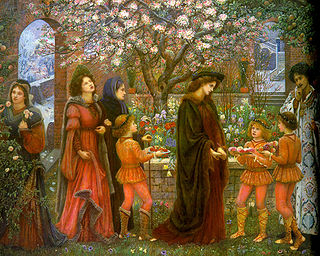Love encompasses a range of strong and positive emotional and mental states, from the most sublime virtue or good habit, the deepest interpersonal affection, to the simplest pleasure. An example of this range of meanings is that the love of a mother differs from the love of a spouse, which differs from the love for food. Most commonly, love refers to a feeling of a strong attraction and emotional attachment.

Magic, sometimes spelled magick, is an ancient practice rooted in rituals, spiritual divinations, and/or cultural lineage—with an intention to invoke, manipulate, or otherwise manifest supernatural forces, beings, or entities in the natural world. It is a categorical yet often ambiguous term which has been used to refer to a wide variety of beliefs and practices, frequently considered separate from both religion and science.

A potion is a liquid "that contains medicine, poison, or something that is supposed to have magic powers.” It derives from the Latin word potio which refers to a drink or the act of drinking. The term philtre is also used, often specifically for a love potion, a potion that is supposed to create feelings of love or attraction in the one who drinks it. Throughout history there have been several types of potions for a range of purposes. Reasons for taking potions ranged from curing an illness, to securing immortality to trying to induce love. These potions, while often ineffective or poisonous, occasionally had some degree of medicinal success depending on what they sought to fix and the type and amount of ingredients used. Some popular ingredients used in potions across history include Spanish fly, nightshade plants, cannabis, and opium.
In J. K. Rowling's Harry Potter series, magic is depicted as a supernatural force that can be used to override the usual laws of nature. Many fictional magical creatures exist in the series, while ordinary creatures also sometimes exhibit magical properties. Magical objects are also described. Witches and wizards refer to the rest of the population, who are generally unaware of magic, as "Muggles" in the United Kingdom and "No-Maj" in the United States.

Eros is a concept in ancient Greek philosophy referring to sensual or passionate love, from which the term erotic is derived. Eros has also been used in philosophy and psychology in a much wider sense, almost as an equivalent to "life energy". The Protestant philosopher C. S. Lewis posits it as one of the four ancient Greek words for love in Christianity, alongside storge, philia, and agape.
Lysis, is a dialogue of Plato which discusses the nature of philia, often translated as friendship, while the word's original content was of a much larger and more intimate bond. It is generally classified as an early dialogue.

A magic item is any object that has magical powers inherent in it. These may act on their own or be the tools of the person or being whose hands they fall into. Magic items are commonly found in both folklore and modern fantasy. Their fictional appearance is as old as the Iliad in which Aphrodite's magical girdle is used by Hera as a love charm.

A curse tablet is a small tablet with a curse written on it from the Greco-Roman world. Its name originated from the Greek and Latin words for "pierce" and "bind". The tablets were used to ask the gods, place spirits, or the deceased to perform an action on a person or object, or otherwise compel the subject of the curse.

Deus caritas est, subtitled De Christiano Amore, is a 2005 encyclical, the first written by Pope Benedict XVI, in large part derived from writings by his late predecessor, Pope John Paul II. Its subject is love, as seen from a Christian perspective, and God's place within all love. Charity is one of the three theological virtues; and the other two were treated in two successive encyclicals, one signed by Benedict and one written substantially by him but signed by his successor Pope Francis . This text begins with a reflection on the forms of love known in Greek philosophy—eros, agape, philia (friendship)—and their relationship with the teachings of Jesus.

The Greek Magical Papyri is the name given by scholars to a body of papyri from Graeco-Roman Egypt, written mostly in ancient Greek, which each contain a number of magical spells, formulae, hymns, and rituals. The materials in the papyri date from the 100s BCE to the 400s CE. The manuscripts came to light through the antiquities trade, from the 1700s onward. One of the best known of these texts is the Mithras Liturgy.

In classical antiquity, including the Hellenistic world of ancient Greece and ancient Rome, historians and archaeologists view the public and private rituals associated with religion as part of everyday life. Examples of this phenomenon are found in the various state and cult temples, Jewish synagogues, and churches. These were important hubs for ancient peoples, representing a connection between the heavenly realms and the earthly planes. This context of magic has become an academic study, especially in the last twenty years.

A magician, also known as an enchanter/enchantress, mage, magic-user, archmage,sorcerer/sorceress, spell-caster, warlock, witch, or wizard, is someone who uses or practices magic derived from supernatural, occult, or arcane sources. Magicians are common figures in works of fantasy, such as fantasy literature and role-playing games, and enjoy a rich history in mythology, legends, fiction, and folklore.

The Magic Item Compendium is a sourcebook written for the 3.5 edition of the Dungeons & Dragons fantasy role-playing game.
The Greek root -phil- originates from the Greek word meaning "love". For example, philosophy is the study of human customs and the significance of life. One of the most common uses of the root -phil- is with philias.

Love magic was an ancient belief that magic can conjure sexual passion or romantic love. Love magic motifs are often used in literature, such as fantasy or mythology. It is believed that it can be implemented in a variety of ways, such as by written spells, dolls, charms, amulets, potions, or rituals. It is attested to on cuneiform tablets from the ancient Near East, in ancient Egyptian texts, in the Greco-Roman world, the Middle Ages, and up to the present day.
In the Dungeons & Dragons fantasy role-playing game, a magic item is any object that is imbued with magic powers. These items may act on their own or be the tools of the character possessing them. Magic items have been prevalent in the game in every edition and setting, from the original edition in 1974 until the modern fifth edition. In addition to jewels and gold coins, they form part of the treasure that the players often seek in a dungeon. Magic items are generally found in treasure hoards, or recovered from fallen opponents; sometimes, a powerful or important magic item is the object of a quest.
Philosophy of love is the field of social philosophy and ethics that attempts to describe the nature of love.

In Ancient Greek religion and mythology, the Erotes are a collective of winged gods associated with love and sexual intercourse. They are part of Aphrodite's retinue. Erotes is the plural of Eros, who as a singular deity has a more complex mythology.

A mandrake is the root of a plant, historically derived either from plants of the genus Mandragora found in the Mediterranean region, or from other species, such as Bryonia alba, the English mandrake, which have similar properties. The plants from which the root is obtained are also called "mandrakes". Mediterranean mandrakes are perennial herbaceous plants with ovate leaves arranged in a rosette, a thick upright root, often branched, and bell-shaped flowers followed by yellow or orange berries. They have been placed in different species by different authors. They are highly variable perennial herbaceous plants with long thick roots and almost no stem. The leaves are borne in a basal rosette, and are variable in size and shape, with a maximum length of 45 cm (18 in). They are usually either elliptical in shape or wider towards the end (obovate), with varying degrees of hairiness.

A love potion is a magical liquid which supposedly causes the drinker to develop feelings of love towards the person who served it.














